Doctor Who has 'changed lives' of LGBT people
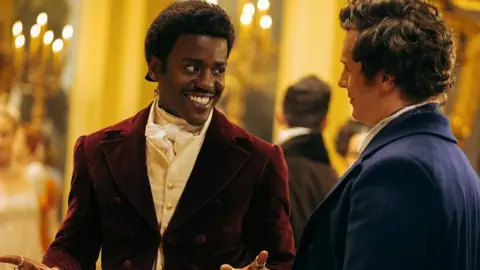 James Pardon/Bad Wolf/BBC Studios
James Pardon/Bad Wolf/BBC StudiosFor Scott Handcock, Doctor Who was his childhood "safe haven" as he struggled with his sexuality and felt like he didn't "fit in".
The sci-fi series changed his life, he said, from binging early episodes on VHS tape in the 1990s to ending up working behind the scenes many years later.
Describing the Doctor Who fandom as like a family "full of hope", he said the show has had a huge, lasting impact, both on him and many other LGBT fans.
In Saturday's season two finale episode, The Reality War, Ncuti Gatwa left his role as the Doctor, regenerating into Billie Piper.
As Pride month begins, many within the LGBT community have shared their life-changing experiences with the show.
Doctor Who's resurgence in 2005 saw production move to Wales, and granted it a whole new generation of fans.
Nearly two decades later, in June 2024, it had a "landmark moment" with a romantic same-sex kiss involving the Doctor, coinciding with Pride month.
As a new graduate in 2006, Scott started out as a runner on Doctor Who on a four-week contract, and has since progressed to script editor. He has also written, directed and produced stories across the Who-niverse, particularly in audio format.
Scott came out as gay at the age of 15, and said the show played a huge role in his formative years.
"Doctor Who literally changed my life," he told Dr Emily Garside on BBC Radio Wales' programme Doctor Who - Time and Space for Everyone.
"People talk about the Doctor Who family and it's absolutely true. People I met back in the early 2000s are still massive parts of my life."
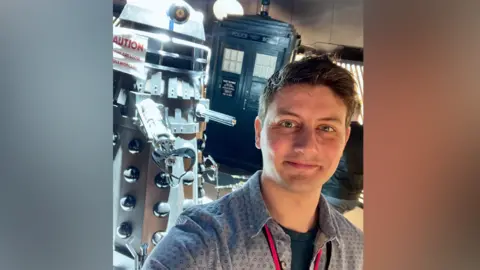 Scott Handcock
Scott HandcockScott recalled growing up in a working-class family in Birmingham, "in a world of soap operas and things" where TV characters were mostly in heterosexual relationships or "settled down" in a nuclear family.
"You could actually take most characters from an episode of classic Doctor Who and their sexual orientation, their gender, how they define, is completely irrelevant... [it] was almost a breath of fresh air."
He continued: "Sometimes when you're feeling a bit isolated, feel like there's no one else like you around, seeing someone like that who's championing you to the ends of the earth, reminds you that those people are out there in real life.
"That was important to me and I think that's important to a whole generation of fans."
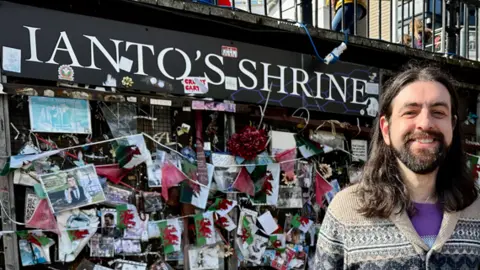 Golden Cat Studios
Golden Cat StudiosScott's experience is not unlike that of the Doctor Who boss himself, Russell T Davies, who has previously spoken about his own love of the show growing up as he hid his sexuality and often felt he was different to his peers.
"Doctor Who was kind of sexless... he's with a beautiful woman all the time and never looks at her sexually. And that's an interesting little chime with a young, gay boy," he said.
Swansea-born comedian Steffan Alun, who coincidentally grew up on the same street as Davies, also found himself represented within the show, despite feeling "stressed" initially .
"When you see someone like you on telly... you're worried that they're going to do something that makes people see you in a different light," he said.
"As a queer man myself, for me Russell T Davies was Queer As Folk, and it's wild and sexy. And the Doctor isn't really like that, Doctor Who is cosy.
"He did make it wilder, but it was brilliant and I shouldn't have doubted him because he understands television, he's one of our great writers."
'Iconic show'
The June 2024 kiss in a regency-era episode - between Ncuti Gatwa's Doctor and Rogue, played by Jonathan Groff - saw a stream of complaints received by the BBC, from viewers "unhappy with a storyline featuring a same-sex romance and kiss".
In response, the BBC said: "As regular viewers of Doctor Who will be aware, the show has, and will always continue to proudly celebrate diversity and reflect the world we live in."
Rylan Clark, who appeared in a recent episode as host of the Interstellar Song Contest, said he was proud to be part of a show that was so unapologetically inclusive.
"It's an iconic show that's entertaining, but it's also proud... it's diverse and it's inclusive," said presenter.
"There aren't many family dramas that have been doing that for, genuinely, decades and it's that sort of visibility... that's so important."
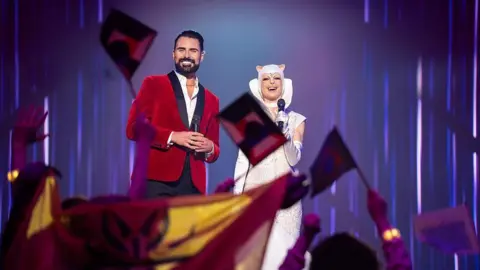 BBC Studios/Bad Wolf/James Pardon
BBC Studios/Bad Wolf/James PardonMeeting like-minded friends has been a huge part of Doctor Who for bisexual fan Paul Robinson from Aberdare, Rhondda Cynon Taf.
"I've got various Dr Who chums who aren't local, but who I've met because we've gone and stood outside a freezing cold building at 03:00, praying for a glimpse of Peter Capaldi's hair. We stand there in the rain, under umbrellas, and we laugh and we laugh," he said.
"I was in my twenties coming out, so when Doctor Who first came back I wasn't out publicly, or even a little bit to myself.
"I think the biggest thing Doctor Who gives anyone in any kind of situation where they're feeling lost, they're feeling alone, they're feeling they can't, it gives you hope."
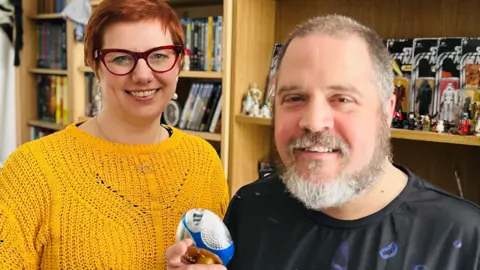 Golden Cat Studios
Golden Cat StudiosJayne Lutwyche, from Cardiff, has been a long-time Doctor Who fan and even got to appear on the show alongside David Tennant and Catherine Tate.
She said, as a bisexual woman, the show "makes you feel like you can be you and you can be open about who you are".
"I think the many different relationships the Doctor has with their companions, but also the companions with each other, kind of really gives that scope that love is love. We need more of that," she said.
"It wasn't always easy to be a teen, it certainly wasn't easy to be a neurodivergent, LGBT teen, back at the turn of the century. Let's make it better. Things like Doctor Who are so valuable for that."
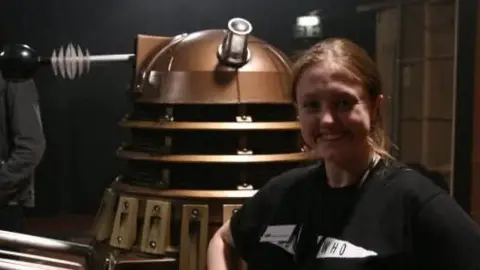 Jane Lutwyche
Jane LutwycheBill Potts, the first openly-gay companion played by bisexual actor Pearl Mackie, has been regularly cited as a key moment in the diversity of the show.
Erica Moore, a Doctor Who fan who spent many years in Cardiff but now lives in Boston, USA, said there were other characters and relationships which stood out as encapsulating the show's widespread appeal.
"The Madame Vastra and Jenny relationship, it's inter-species and queer, so that was really nice to see. They're set in Victorian England together, again that's kind of [showing] queer people have always existed," they said.
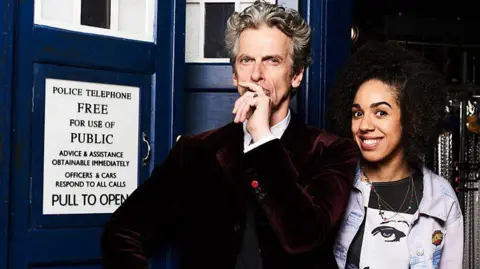 BBC Studios
BBC StudiosErica added they were "really interested in the episode Gridlock", where the Doctor goes from vehicle to vehicle speaking to people to try and figure out why they are all stuck.
"There's a lesbian couple, an older lesbian couple... I thought that was really cool because it's just, 'here's all these different couples and all these different families'.
"A lot of the time [when] you have queer characters, [it's] focusing on the struggle and how hard it is to be queer, but I liked that this was just another couple to exist."
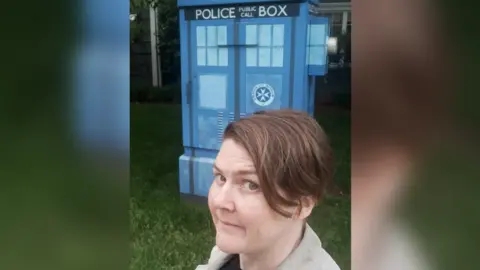 Erica Moore
Erica MooreAnd it's not just Doctor Who but the entire Who-niverse which has made an impression on the LGBT community.
Spin-off show Torchwood left a lasting legacy when it concluded in 2011, with a shrine at Cardiff Bay commemorating the late character Ianto Jones who was in a relationship with John Barrowman's pansexual character Captain Jack Harkness.
"I think at that time, still, queer representation in sci-fi in particular was there but maybe a little bit shallow sometimes," said Steffan Alun.
"This was a slightly messier story. Ianto didn't consider himself gay, it was just Jack, and yet that relationship was so loving and so true."
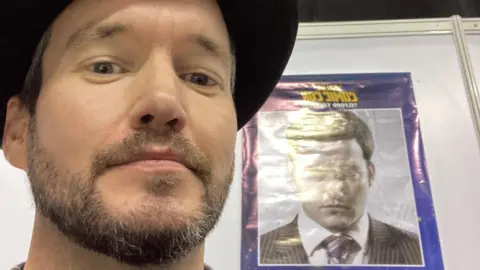 Gareth David-Lloyd
Gareth David-LloydGareth David-Lloyd, who played Ianto Jones, said at the time of filming he had no idea what the impact of the character would be.
"I just felt incredibly lucky to be there, to be on a sci-fi show written by Russell and to be playing a character who falls in love with his boss, which meant as an actor I got more to do," he said.
"When we finished filming and I started to realise the cultural impact Ianto and his relationship with Jack was having, it was a big surprise, a very moving surprise.
"I certainly wasn't expecting a shrine to be erected, and maintained for 20 years after. On one hand, it's a bit bonkers, but on the other it's a monument to the impact Ianto, and his relationship with Jack, had on the queer community, and one that I'm really proud of."
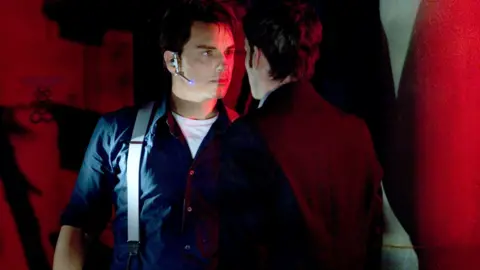
He added: "I remember being moved to tears quite a number of times by fans saying how Ianto's relationship with Jack has helped them.
"Sci-fi, certainly for me when I was younger, was always about escaping to a better place, a better world where technology is evolved, politics is evolved, people are evolved.
"I think if accepting people's identities, who they are, is part of that better world, then that could be quite powerful."
